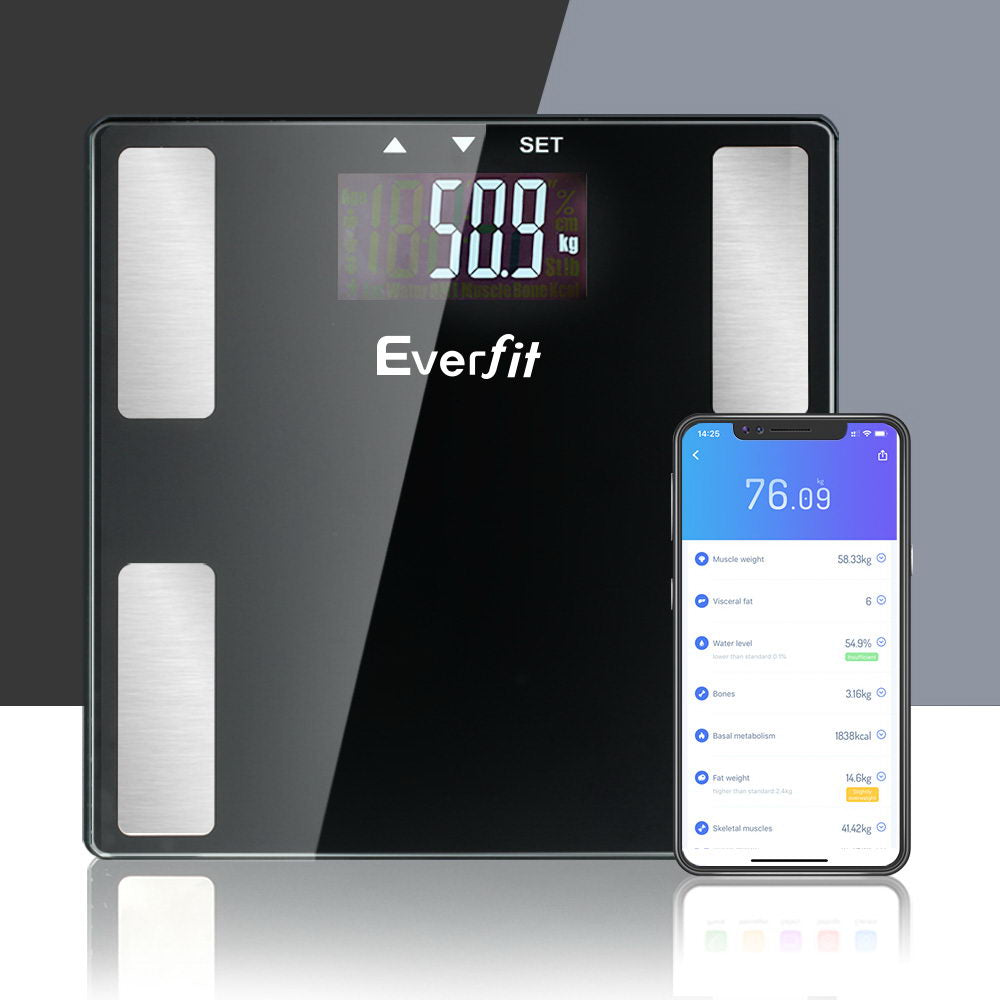Great product. I have to buy the adapter separately for Australia as this came with the japanese plug.
Great, excellent quality product. Delivered in record time. Highly recommended.
$0.00 AUD







Tristar Online
Out of stock
Couldn't load pickup availability
Kicking your fitness goals has just become easier with our Everfit Scale. Equipped with four high-precision sensors, the scale measures 23 unique parameters including weight, BMI, body fat ratio, lean mass, water percentage, muscle mass, bone mass and more, so you can see a complete picture of your health. The scale shows measurements in three units (kg, lb and st-lb) with a weight capacity of 180kg, 400lbs or 28st. The scale has a durable 6mm thick tempered glass platform, and the entire super slim ensemble is only 20mm thick for easy storage and maintenance. To use the scale, just download the Scale Up app onto any iOS or Android phone, open the app and pair the scale to your phone using Bluetooth. The scale will display the results on the large LCD display after each weigh-in and you can store data for up to 99 users. With other great features such as baby scale mode, low power/overload indication and auto on/off, our scale makes keeping track of your health fast and easy.
Features
Android or iOS system via Bluetooth (Bluetooth 4.0)
Measures 23 parameters
Four high precision sensors
6mm thick tempered glass platform
20mm thick slim design
180kg weight capacity
Large LCD display
Baby scale mode
Low power indication
Overload indication
Auto on/off
Specifications:
Platform material: Tempered glass
Capacity: 5kg to 180kg
Division: 100g
Unit: kg/lb/st-lb
Memory: 99+ persons
Power: 2 x 1.5V AAA batteries (not included)
Overall dimensions: 30cm x 30cm x 2.4cm
Colour: Black
Assembly required: No
Number of packages: 1

Package Content
1 x Body fat scale
1 x User manual
In today's digital age, ensuring your children's safety while they browse the internet is paramount. As they explore the vast online world through smartphones, gaming consoles, laptops, and other devices, it's essential to implement measures to shield them from potentially harmful content and interactions. Here are some tips to help you safeguard your children online:
Open and ongoing communication with your children about online safety is crucial. Discuss the potential dangers they may encounter online, such as pornography, cyberbullying, and violent content. Encourage them to come to you with any concerns or questions they may have.
Establish clear rules and boundaries regarding internet usage. Define appropriate time limits for browsing and specify which websites and apps are off-limits. Make sure your children understand the consequences of violating these rules. You can also restrict some of these apps or online content utilizing device level parental controls explained below.
Take advantage of the parental control features available on devices and internet browsers. These controls allow you to block access to specific websites, set age-appropriate content filters, and monitor your children's online activities. Familiarize yourself with the parental control options on smartphones, gaming consoles, and laptops to effectively manage your children's online experiences.
Stay informed about the latest trends and technologies related to online safety. Familiarize yourself with popular social media platforms, gaming communities, and messaging apps that your children may use, including the functions they provide. This knowledge will help you understand the potential risks and take appropriate action to protect your children.
Regularly monitor your children's online activities to ensure they are adhering to the rules and staying safe. Keep an eye on their browsing history, social media interactions, and messaging apps. Be vigilant for any signs of cyberbullying or exposure to inappropriate content.
Teach your children about the importance of practicing safe online behavior. Remind them never to share personal information, such as their full name, address, or phone number, with strangers online. Encourage them to think critically about the content they encounter and to report anything that makes them feel uncomfortable or unsafe.
Be a positive role model for your children by demonstrating responsible and respectful online behavior yourself. Show them how to navigate the internet safely and responsibly, and emphasize the importance of treating others with kindness and empathy online.
For additional resources and guidance on online safety, visit the Australian e-Safety Commissioner's website at www.esafety.gov.au. Here, you'll find a wealth of information, including tips for parents, educational resources for children, and tools for reporting online abuse and harassment.
You can also report abuse through the website’s online form.
By following these tips and utilizing available resources, you can help keep your children safe from pornography, cyberbullying, violent content, and other unsafe material while they navigate the internet. Remember, proactive measures and open communication are key to fostering a safe and positive online environment for your family.







Excellent service
Great product. I have to buy the adapter separately for Australia as this came with the japanese plug.
Great, excellent quality product. Delivered in record time. Highly recommended.
